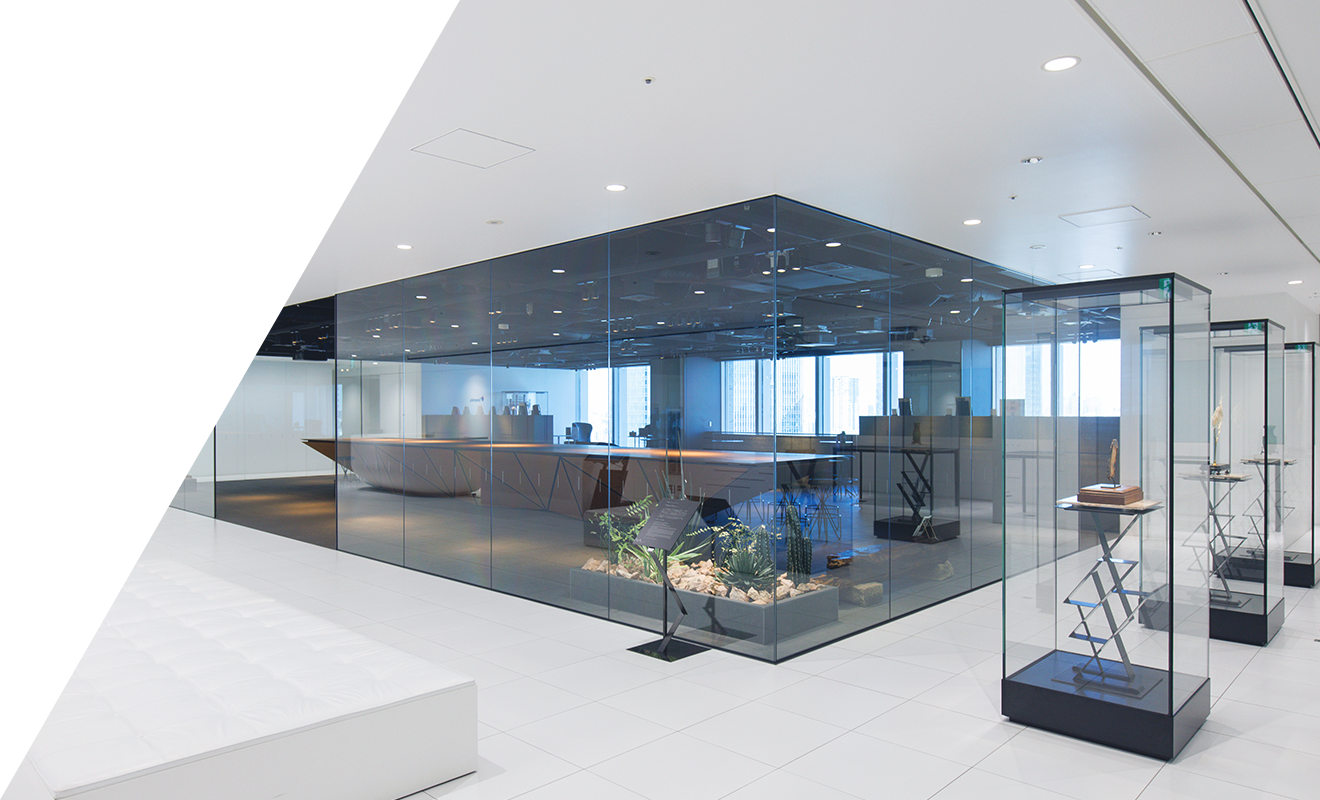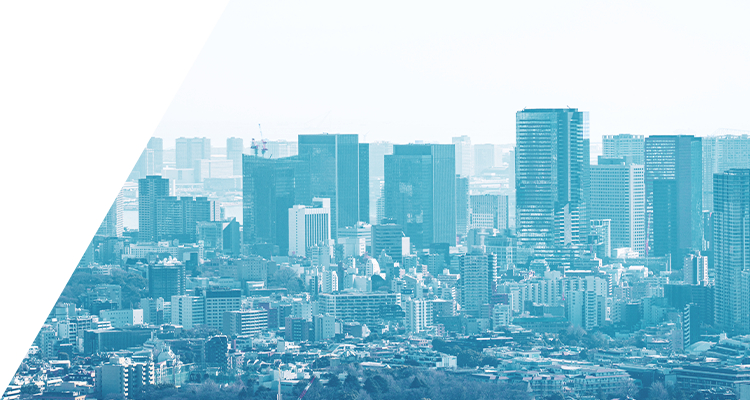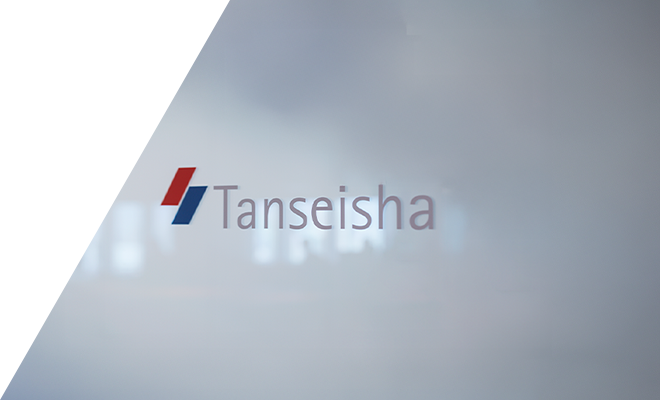Site Search
Development of a responsible supply chain
By expanding our network and building relationships of trust with our cooperating and partner companies, we will build a foundation for value creation, including quality and safety, and address sustainability issues, such as the environment and human rights, throughout our supply chain.
- TOP
- Sustainability
- Development of a responsible supply chain
Tanseisha Group Sustainable Procurement Policy and Guidelines
Based on its purpose of "Painting the future through space, bringing color to people and society," the Tanseisha Group has established the following sustainability policy: "Through our business of creating valuable spaces, we will confront environmental and social issues and sincerely work to resolve them, thereby striving to sustainably improve our corporate value and contribute to the realization of a colorful and sustainable society." To achieve this, we have established the "Tanseisha Group Sustainable Procurement Policy" and "Tanseisha Group Sustainable Procurement Guidelines" with the aim of building strong relationships of trust with our business partners, including our cooperating companies, as good partners and resolving environmental and social issues throughout the entire supply chain.
The "Tanseisha Group Sustainable Procurement Policy" indicates the basic stance that the Tanseisha Group should take towards sustainable procurement, and the "Tanseisha Group Sustainable Procurement Guidelines" encourage our group and our partner companies to put into practice efforts in accordance with the policy. We also ask our partner companies to encourage efforts based on this policy and guidelines, and by promoting understanding and penetration of these guidelines, we will promote sustainable procurement activities throughout the entire supply chain.
Tanseisha Group Sustainable Procurement Policy
- Compliance with laws and regulations and respect for social norms
We will comply with the laws and regulations applicable in the countries and regions in which we conduct business, and will respect social norms. - Fair and impartial trading
We will take a fair and impartial approach to transactions, provide a wide range of trading opportunities, and make selections based on economic rationality by comprehensively evaluating safety, technical capabilities, price, delivery time, environmental friendliness, business situation, etc. - Thorough corporate ethics
We will conduct procurement activities with the highest ethical standards. - Maintenance and improvement of occupational safety and health
We will establish a system for managing safety and health, proactively ensure safety, including by third parties, and improve the working environment, striving to maintain and improve safety and health. - Ensuring quality and safety
For all services, we strive to understand customer needs and ensure appropriate quality as well as safety and security. - Respect for human rights
Based on the Tanseisha Group Human Rights Policy, we respect basic human rights throughout our supply chain. - Environmental Considerations
We are committed to protecting Environmental Consideration and reducing the burden on the environment through all of our corporate activities, including Environmental Consideration in spatial creation, such as eco-conscious design and reducing industrial waste generation, and will contribute to the realization of a decarbonized, symbiotic society and a circular economy. - Protection and respect of intellectual property rights
We respect and protect the legitimate intellectual property rights of third parties. - Ensuring information security
We will endeavor to ensure information security by taking into consideration the protection of personal information, confidential information, and customer information related to our business. - Contribution to Society
We will utilize our management resources to engage in activities that contribute to the development of the local community and society. - Responding to disasters and other unforeseen circumstances
We will prepare for large-scale disasters and other unforeseen circumstances during peacetime by establishing a risk management system and developing a business continuity plan, and will actively support and cooperate in the recovery and restoration efforts in the event of a disaster.
Established on August 1, 2019
Revised on February 1, 2025
President and Chief Executive Officer Osamu Kobayashi
Tanseisha Group Sustainable Procurement Guidelines
- Compliance with laws and regulations and respect for social norms
We will comply with the laws and regulations applicable in the countries and regions in which we conduct business, and will respect social norms.- We will comply with all domestic and international laws and regulations (Construction Business Act, Subcontract Act, Personal Information Protection Act, Copyright Act, Environmental Protection Act, Labor Act, etc.) that govern our business activities, and respect social norms.
- We have established an internal reporting system for our employees and partner companies, and will thoroughly protect the confidentiality and rights of whistleblowers, and use the content of reports to improve corporate behavior.
- Fair and impartial trading
We will take a fair and impartial approach to transactions, provide a wide range of trading opportunities, and make selections based on economic rationality by comprehensively evaluating safety, technical capabilities, price, delivery time, environmental friendliness, business situation, etc.- We will conclude business agreements in accordance with fair and transparent procedures, including receiving appropriate quotations and entering into written contracts before construction begins.
- When conducting business, we select suppliers based on a comprehensive evaluation of factors such as cost competitiveness, quality assurance, reliability of delivery dates, technical capabilities, financial strength, social credibility as a company, consideration for social issues such as the environment and human rights, and business performance.
- In transactions, we prohibit the abuse of a dominant bargaining position, such as seeking unfair benefits or preferential treatment, and refrain from any actions that impede transparency and free competition, conducting transactions on an equal footing.
- We will disclose corporate information, including management details, business activities, and sustainability activities, voluntarily, in a timely and appropriate manner, and promote communication with a wide range of stakeholders.
- Thorough corporate ethics
We will conduct procurement activities with the highest ethical standards.- We will reject all ties with antisocial forces and will firmly refuse any unreasonable demands.
- We will maintain transparent and healthy relationships with all stakeholders and will not engage in any unethical acts, including bribery, extortion, embezzlement, or other corrupt practices.
- Maintenance and improvement of occupational safety and health
We will establish a system for managing safety and health, proactively ensure safety, including by third parties, and improve the working environment, striving to maintain and improve safety and health.- Promotes a safe and clean working environment.
- We strive to create a comfortable working environment where everyone can work safely and in good health, both physically and mentally.
- We will promote disaster prevention activities and strive to prevent workplace accidents.
- Ensuring quality and safety
For all services, we strive to understand customer needs and ensure appropriate quality as well as safety and security.- By providing optimal construction work and related services, we ensure the quality of the construction objects (strength, functionality, durability, precision, workmanship, etc.) and the quality of the construction process that our customers require.
- We will strive to independently and continuously improve our technological capabilities in order to improve the quality of our technologies and services to resolve environmental and social issues.
- We will comply with relevant laws and regulations when improving the working environment and prevent damage to workers' health.
- We will thoroughly prevent health hazards to facility and space users through appropriate equipment planning, material selection, and construction method considerations.
- If any quality-related accidents or defects occur, we will promptly report them and take appropriate measures.
- Respect for human rights
Based on the Tanseisha Group Human Rights Policy, we respect basic human rights throughout our supply chain.- We will comply with and respect internationally recognized laws and standards regarding basic human rights and labor.
- We will not tolerate any discrimination, harassment, or other unfair treatment on the basis of nationality, race, ethnicity, religion, ideology, sex, age, disability, gender identity, sexual orientation, employment status, or any other grounds.
- We strive for mutual understanding, respect diversity, individuality and personality, and strive to create a healthy and rewarding working environment.
- We respect workers' rights, including freedom of association, the right to collective bargaining, and payment of fair wages.
- Environmental Considerations
We are committed to protecting Environmental Consideration and reducing the burden on the environment through all of our corporate activities, including Environmental Consideration in spatial creation, such as eco-conscious design and reducing industrial waste generation, and will contribute to the realization of a decarbonized, symbiotic society and a circular economy.- We will promote the improvement of environmental performance and reduction of environmental impact in spaces toward a carbon-free society.
- We will promote 3R activities, including the selection of materials and products to be used, and the development of recycling activities that contribute to the realization of a resource-circulating society.
- We will promote efforts to conserve biodiversity and ensure the sustainability of water resources, biological resources, etc., in order to create a society in harmony with nature.
- We will promote sustainable procurement and take measures to mitigate risks such as environmental pollution and environmental impacts resulting from our business activities.
- Protection and respect of intellectual property rights
We respect and protect the legitimate intellectual property rights of third parties.- We will not engage in any infringing acts such as the improper use or unauthorized use of intellectual property.
- We respect the rights of our business partners and treat them appropriately. We do not use our business position to ask for the transfer of rights.
- We will provide employees with educational programs to further their knowledge of intellectual property and ensure compliance with laws and regulations.
- Ensuring information security
We will endeavor to ensure information security by taking into consideration the protection of personal information, confidential information, and customer information related to our business.- We will properly manage, protect and provide education on personal information, customer information and confidential information to prevent unauthorized or inappropriate use, disclosure or leakage.
- We implement defensive measures against computer and network threats to prevent damage related to information leaks.
- Contribution to Society
We will utilize our management resources to engage in activities that contribute to the development of the local community and society.- We respect local cultures and customs, and strive to earn the trust of local communities by engaging sincerely with them.
- Through our business activities, we contribute to the development of local communities by creating excitement, revitalizing the area, and passing on and promoting history and culture.
- Responding to disasters and other unforeseen circumstances
We will prepare for large-scale disasters and other unforeseen circumstances during peacetime by establishing a risk management system and developing a business continuity plan, and will actively support and cooperate in the recovery and restoration efforts in the event of a disaster.- We will continue to have a risk management system in place to prepare for large-scale disasters and strive to maintain our supply chains.
- After ensuring the safety of our employees and their families, we will work to preserve Tanseisha's facilities, including worksites, and strive to restore business activities as quickly as possible.
- In order to contribute to local communities, we will cooperate with the recovery and reconstruction efforts of national and local governments.
Safety, health, quality and environmental initiatives
Our basic policy for health and safety management is to "establish preventive activities as the foundation of health and safety, and aim for zero disasters and accidents." We have established various policies and priorities to ensure safe construction, high quality, and Environmental Consideration, and are working on a variety of activities together with our group companies and partner companies.
Tanseisha Group Safety and Health Policy
Based on the idea of "respect for human life," the Tanseisha Group adheres to the principle of "safety first." By striving to maintain and improve safety and health in order to protect the lives and health of employees working at our offices and worksites, as well as everyone involved in our business, we build the foundation for our corporate activities and contribute to the realization of a colorful and sustainable society.
- Compliance with laws, regulations and rules
We will comply with laws, regulations, standards, and internal rules related to occupational health and safety. - Operation of the safety and health management system
We will establish and operate a system for health and safety management and strive for continuous improvement. - Improving the workplace and work environment
We strive to create a comfortable workplace and working environment where everyone can work safely and healthily, both physically and mentally. - Prevention of industrial accidents
In order to eliminate disasters and accidents, we will work with our partner companies to promote disaster and accident prevention activities based on prevention. - Promoting voluntary safety and health activities
By implementing safety and health education, we aim to raise safety and health awareness among employees and partner companies, and support the promotion of voluntary safety and health activities.
Tanseisha Group Quality Policy
By providing services of the appropriate quality, the Tanseisha Group builds relationships of trust with customers, business partners such as partner companies, and society, and contributes to the realization of a colorful and sustainable society.
- Meeting customer needs
We will accurately understand our customers' expectations and needs and provide services that meet them. - Compliance with laws and regulations
We will comply with quality-related laws, regulations, rules, guidelines, etc. as the foundation of our business activities. - Ensuring safety and security
In the spaces and services we provide, we aim to ensure the safety and security of our users and create moving experiences. - Contribution to the environment and society
We will be aware of the impact our business activities have on the environment and society, and will contribute to solving environmental and social issues by working to reduce waste and make effective use of resources. - Quality control system operation
All employees are responsible for their daily work, regularly assess the quality and maintenance status, and continuously implement improvement activities across our services. - Human resource development and supply chain collaboration
We will focus on educating our employees, who are the key to quality, and strengthen cooperation with our partner companies to promote collaboration toward achieving common quality standards throughout the entire supply chain.
Holding safety and health committee meetings (managed by monthly emphasis themes)
As a health and safety organization, we have established a joint labor-management health and safety committee that covers all employees and has established an occupational health and safety management system. The health and safety committee is chaired by Director in charge of production (Chief Health and Safety Manager) and is made up of employees with experience in health and safety management.
The Health and Safety Committee meets monthly to collect information on health and safety management and quality technology improvement in offices and on-site to prevent injuries, illnesses, fires, and industrial accidents among employees of our company and our partner companies, and to provide coordination, instructions, and guidance to relevant departments. The committee also reflects employee opinions in its efforts.
Safety performance
In fiscal year 2024, there were zero fatalities or injuries among our employees due to work-related accidents.
The rate of accidents resulting in lost work time, a standard safety indicator in Japan, is lower than the statistical value for the general construction industry.
(FY2024: 0.0% for our company / 1.91% for general construction)
*Compared with general construction companies with similar safety and health management systems and work content at work sites, based on the Ministry of Health, Labor and Welfare's "Overview of the 2024 Industrial Accident Trends Survey."
Initiatives to reduce industrial waste
We are working on industrial waste management in accordance with the "Industrial Waste Management Regulations," which aim to reduce the amount of waste generated at our production sites, promote the recycling of generated waste, and manage waste so that it is disposed of legally.
We hold an industrial waste countermeasures committee twice a year to check the amount of industrial waste processed and the separation status of each contractor, and consider ways to reduce the amount of waste processed and improve the separation rate. In addition, we properly screen contractors and conduct on-site inspections when selecting them.
Implementing educational and enlightenment activities to strengthen safety and improve quality
Holding of "Tanseisha Safety Conference"
In preparation for National Safety Week, which is held every July, we hold the "Tanseisha Safety Conference" with our group companies and partner companies. At the safety conference, we strive to improve and raise safety awareness at construction sites by holding special safety lectures by lecturers from both inside and outside the company and by having employees give presentations on their safety management experiences at construction sites, with the aim of strengthening safety. We also share information on sustainability, including social and environmental issues.
"Production Seminar"
At our "production seminars," we work to strengthen safety and improve quality and technology by raising awareness of safety and quality management and providing various types of education.
Providing various safety education and information
We provide various safety education and information to improve safety awareness among our employees and partner companies.
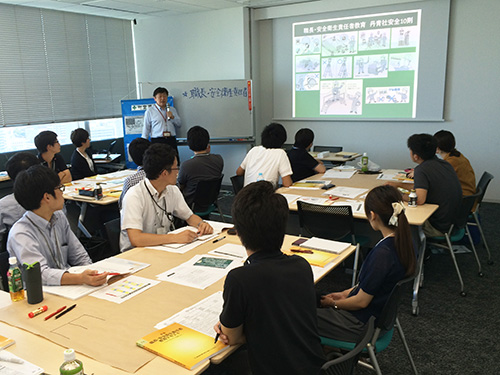
Foreman and health and safety officer training
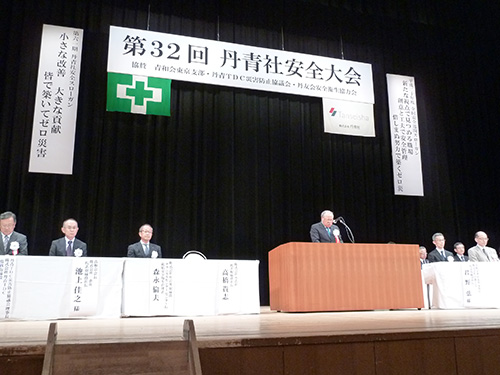
Tanseisha Safety Conference
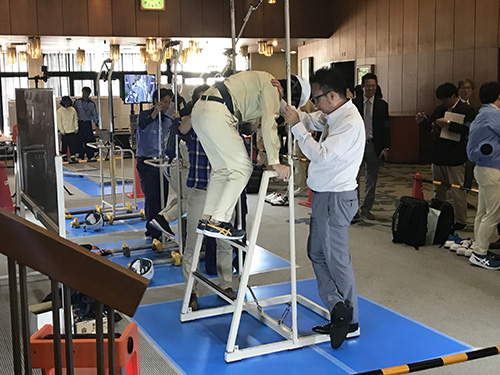
Experience using a full harness-type fall protection device (Tanseisha Safety Conference)
Cooperation with partner companies
We operate the "Seiwakai Safety and Health Cooperation Association (Seiwakai)," an organization made up of Tanseisha and our partner companies that do business with us on construction projects, as important partners in creating spaces. Seiwakai is engaged in safety and health activities and quality improvement activities, mainly through subcommittees such as the Safety Committee and Education Committee. At the "Disaster Prevention Council," which is held twice a year, group discussions are held to eliminate the repeated occurrence of disasters and accidents, and it is an opportunity to learn about "awareness of danger." We also participate in disaster prevention councils at each worksite, and make presentations on the causes and countermeasures of accident cases.
Other major activities with partner companies
・Sharing of procurement policies
・Monthly joint safety patrols (each month)
- Providing education and information to improve members' safety awareness and skills, and to help them obtain qualifications
・Check the insurance status of each partner company
- Joining non-statutory workers' compensation, which expands coverage to include partner companies
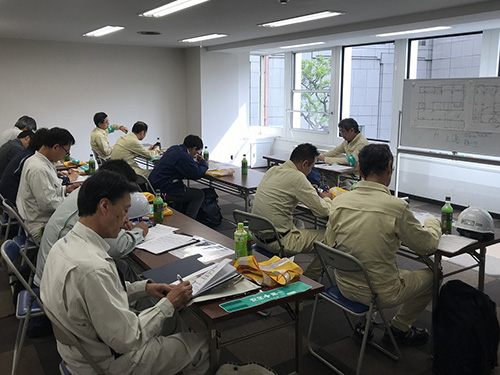
Seiwakai Safety Patrol Site Explanation
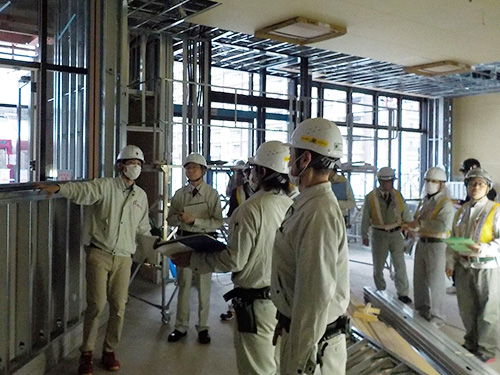
Seiwakai Safety Patrol
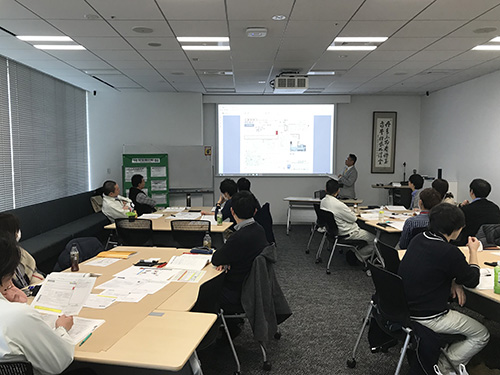
Disaster Prevention Council
Maintenance and Repair Initiatives
Utilizing our nationwide network of partner companies, we support the facility life of your store with prompt, high-quality maintenance and repair services. We have a 24/7 reception system, and in the event of an emergency, we can quickly arrange and respond to it to minimize loss of business opportunities, and through regular maintenance, we contribute to the stable operation and long life of your store.
Additionally, in order to handle the maintenance of Spatial Production that use digital technology, which is being increasingly introduced, we continue to hold regular coordination meetings with related parties to promote the strengthening of our maintenance response.
Business Introduction > List of Related Businesses > Maintenance and repair utilizing our experience and specialized skills in space creation
Strengthening the production base
Through the operation of a partnership system, we are strengthening our network and relationships of trust with partner companies that support spatial creation, and are working to enhance our production base for sustainable business growth. In addition to improving the efficiency of on-site management tools through the introduction and utilization of digital transformation, we are also providing education and guidance to promote the collaboration of BIM data with partner companies, thereby improving and expanding productivity.
Partnership Building Declaration
Support
Tanseisha agrees with the spirit of the "Partnership Building Declaration" put forward by the Cabinet Office, the Small and Medium Enterprise Agency and others, and has published the "Partnership Building Declaration" which aims for coexistence and prosperity throughout the entire supply chain and for increasing mutual added value through new collaboration.
Tanseisha Partnership Building Declaration
We declare that we will focus on the following items in order to build new partnerships by promoting collaboration and coexistence and mutual prosperity with our supply chain partners and business operators seeking to create value.
-
Coexistence and mutual prosperity throughout the supply chain and new collaboration beyond scale and affiliation
By working with not only our direct business partners but also those deeper in the supply chain, we aim to increase added value throughout the supply chain, and to build mutually beneficial relationships with our business partners through collaboration that goes beyond existing business relationships and corporate scale.
(Individual item) We will strive to prioritize procurement from companies that are actively engaging in environmental considerations, such as by providing products and services that have a low environmental impact. -
Compliance with the "Promotion Standards"
We will comply with desirable trade practices between outsourcing businesses and small and medium-sized contractors ("promotion standards" based on the Contractor Small and Medium Enterprise Promotion Act), including improvements to ordering methods, methods for determining compensation, methods for payment, trading conditions related to molds, etc., protection of intellectual property, and fair trade practices, and will actively work to correct trade practices and business practices that hinder the building of partnerships with business partners. -
Other (optional)
Tanseisha has worked with partner companies and suppliers to create a safe and comfortable facility environment while taking into consideration compliance with laws and regulations, reducing environmental impact, and respecting human rights. As interest in corporate social responsibility continues to grow, we will further strengthen our partnerships for mutual development and continue to contribute to society as a whole supply chain.
January 13, 2026
I hereby declare that I understand the contents of the "Promotion Standards" based on the Entrusted Small and Medium Enterprise Promotion Act.
TANSEISHA Co., Ltd.
President and Chief Executive Officer Osamu Kobayashi
For each category, the following tags are used to indicate the correspondence with the core subjects of ISO 26000.
| Corporate governance. | Corporate governance. |
|---|---|
| Human Rights | Due diligence | Human rights risk situations | Avoidance of complicity | Resolving grievances | Discrimination and vulnerable groups | Civil and political rights | Economic, social and cultural rights | Fundamental principles and rights at work |
| Labor Practices | Employment and employment relationships | Conditions of work and social protection | Social dialogue | Health and Safety at work | Human development and training in the workplace |
| Environment | Prevention of pollution | Sustainable resource use | Climate change mitigation and adaptation | Protection of the environment, biodiversity and restoration of natural habitats |
| Fair Operating Practices | Anti-corruption | Responsible political involvement | Fair competition | Promoting social responsibility in the value chain | Respect for property rights |
| Consumer Issues | Fair marketing, factual and unbiased information and fair contractual practices | Protecting consumers’ health and safety | Sustainable consumption | Consumer service, support, and complaint and dispute resolution | Consumer data protection and privacy | Access to essential services | Education and awareness |
| Community (Community Involvement and Development) |
Community involvement | Education and culture | Employment creation and skills development | Technology development and access | Wealth and income creation | Health | Social investment |
